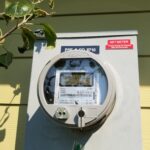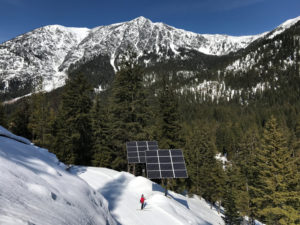6 Things You Must Know Before Going Off-the-Grid
6 Things You Must Know Before Going Off-the-Grid
The idea of powering a home off the grid with free solar energy is appealing to many individuals. However, as we often say, “If it were that simple, everyone would be doing it.”
For those who have always relied on grid power, it’s easy to have an idealized view of what life would be like without a utility company. But opting for off-grid power is not advisable if there is reasonable access to the grid.
Read on for six things that you should be aware of before choosing an off-grid lifestyle.
1. Going off-the-grid doesn’t mean no more power bill.
There is a common misconception that when you go off-grid you buy your renewable energy equipment and never have to pay for electricity again. While it’s a lovely idea, it is somewhat inaccurate. By choosing off-grid solar power you don’t have a utility bill anymore, but you will have ongoing costs associated with powering a home off the grid.
2. Off-grid solar is a great solution when utility power can’t be brought in, or when bringing in utility service is cost prohibitive.
Being unable to get power to a site is pretty straight-forward. Cost prohibitive to bring power in is more relative because it depends on the amount of power you need, and the cost to bring in power. But for full-time residences, this figure is typically higher than most people anticipate.
Some people consider $10,000-$20,000 to be very expensive. Yet at this price bringing in utility power is an extremely good value. Cost prohibitive for running a new electrical service to a full time home is more in the $75,000+ range.
Now that may seem like a lot of money but think of it this way: when you’re on the grid you share all the costs of generating and transmitting electricity with everyone else connected to the grid. When you’re powering your home off grid, all of those expenses are yours and yours alone. And it’s not just the upfront costs to keep in mind, there are also ongoing expenses to factor in – fuel for a supplemental generator (a must for most off grid applications) and battery replacement costs are the main ones. So, unless it’s just a vacation cabin or you only need power for small items like lights, cell phones and maybe a small refrigerator, grid power may still end up being the more cost effective solution long-term.
But, when you are comparing options, remember that bringing in grid power isn’t just the price your utility charges for laying the lines and installing the transformers. There might also be site work (like trenching) and the cost to run wire from the utility line to your actual structure. Be sure to factor all costs into your decision about which way to go, while also remembering that site work may also be required if you do an off grid solar system.
3. Being energy efficient when you’re on the grid is very different than when you’re off the grid.
In this day and age, being energy conscious is part of our culture. We turn off lights we’re not using, we buy Energy Star appliances, and we put on a jacket instead of turning up the thermostat. All these steps are important whether you’re on or off the grid.
When you’re off-grid, however, every light bulb, charging cell phone, and appliance clock matters; a lot. If you use more power than your solar produces or than is stored in your batteries, you can’t just buy a little extra this month from your utility – you must generate it yourself, or out go the lights. Being your own power company doesn’t mean you have to go without, it just means you need to pay close attention whenever you’re using electricity.
4. Maintenance, and Power Outages
When picturing a life off the grid, many people overlook the hidden advantages of being connected to utility power. Utility workers consistently perform maintenance, upgrades, and repairs on the equipment responsible for generating and transmitting power to their customers. Furthermore, in the event of a power outage, all you need to do is wait for the workers to resolve the issue.
On the other hand, when you become your own power company, these responsibilities fall into your hands. Which means if your power goes out while living off the grid, you cannot simply wait for it to come back on. As your own power provider, the responsibility of getting your equipment back up and running rests solely on you.
So picture this: your power suddenly goes out in the middle of the night. You are either up in your pajamas trying to figure out what went wrong, or waiting until an off-grid solar expert like Fire Mountain Solar is available during regular working hours to assist you in troubleshooting the problem.
Therefore, if when it comes to your power source you prefer a totally hands off approach, off grid power probably isn’t for you.
5. Don’t ditch your electrical service if you already have it.
 Many people want to cut ties with the local utility because they don’t want bills or because they want more control over their power. But depending on your location, disconnecting your home may be illegal and may invalidate the certificate of occupancy for your home. Even if you can legally disconnect, you’d miss out on the convenience that utility power offers.
Many people want to cut ties with the local utility because they don’t want bills or because they want more control over their power. But depending on your location, disconnecting your home may be illegal and may invalidate the certificate of occupancy for your home. Even if you can legally disconnect, you’d miss out on the convenience that utility power offers.
Does that mean you’re stuck? Definitely not. Instead of going off-grid, consider a grid-tie solar system with backup capability. This type of system provides the best of both worlds when it comes to power systems. You get the flexibility and convenience of utility power while also reducing or even eliminating your expenses for electricity (except for your base fee). And, you will have emergency power during any utility outages.

6. Off-grid power is only for the adventurous in spirit.
Yes and no. You don’t need to be the type to climb mountains or sail the seven seas to go off grid. You do need to be ready for a little work and a fair amount of learning. An off-grid power system can be high maintenance or minimal maintenance, depending on the equipment you select. This is especially true about energy storage options.
Go where you want to go, have the power to do what you want to do.
There are so many places to enjoy that are beyond the power lines. But that doesn’t have to mean roughing it at your weekend getaway cabin or out-of-the-way home. Off grid power systems allow you to have all the comfort and convenience electricity offers, without being confined to the footprint of the electrical grid. So go ahead and leave the beaten path. We have hundreds of clients who have done it, and so can you.

